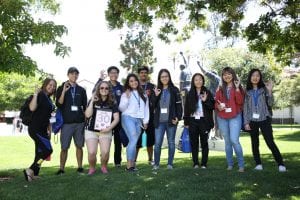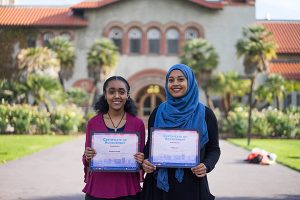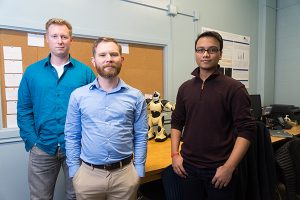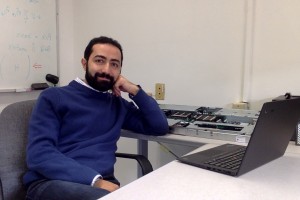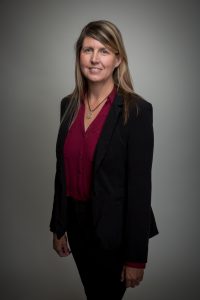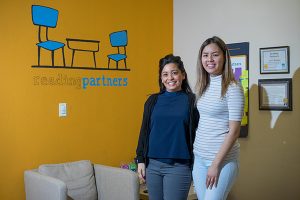
Inspired by the Campus Reading Program selection “Hot Dogs and Hamburgers” by Rob Shindler, students in the Connie L. Lurie College of Education started a book drive to donate to literacy programs in the Bay Area. SJSU student Charlene Abi poses with Janene Perez at the Reading Partners headquarters in Milpitas where donated books were delivered.
(Photo: James Tensuan, ’15 Journalism)
By David Goll
The 2017-18 Campus Reading Program selection ignited a spark in some readers to take immediate action after they read Rob Shindler’s “Hot Dogs and Hamburgers.” The book by first-time author and Chicago attorney Shindler tells the story of how he helped his young son overcome a learning disability and got involved in supporting adult literacy. Shindler, who visited the campus in October as part of the activities around the book, was impressed with SJSU’s particular approach to the reading program.
Incoming freshmen, faculty, staff and some other campus community members received copies of the book and were invited to read it in preparation of participating in a roster of fall activities such as book discussions as well as a visit from the author.
“There is a strong community service element to the program, and it allows authors like me a chance to get the word out about our cause,” Shindler said.
Scot Guenter, a professor of American Studies at SJSU, oversees the university’s reading program, which has a history of selecting books that tackle important social issues. Inspired by Shindler’s story and the campus activities held in the fall, students, staff and faculty in the Connie L. Lurie College of Education started a book drive with a local nonprofit that supports literacy for elementary school students. The team collected 874 books for Reading Partners, a nonprofit that provides one-on-one tutoring to students in kindergarten through fourth grade in three local counties.
Dr. Robin Love, interim associate dean of the College of Education, helped coordinate the book drive along with Janene Perez, lecturer and director of the College of Education’s Student Success Center. Love and Perez were so encouraged by the outcome that the college has plans for a second book drive during this semester, with a goal of collecting 1,000 books.
“I think it’s a realistic goal,” said Love, adding that Shindler’s book was an excellent selection, especially for students of education. “It’s so well-suited to our students and our college, which has a strong emphasis on helping special needs students and promoting social justice.”
The fall activities also included a panel discussion with recent graduates. Erin Enguero, ’16 Kinesiology, and Gerardo Garay, ’17 Kinesiology, both overcame disabilities to complete successful academic careers at the university. Dr. Karin Jeffery, a professor in the College of Applied Sciences and Arts’ Department of Kinesiology, facilitated the panel.
“Erin won many academic awards here,” Jeffery said, including an Outstanding Graduating Senior Award in 2016. “Gerardo is an amazing example of a student who defied expectations and came back from great adversity.”
Enguero, whose genetic bilateral hearing loss was diagnosed at the age of five, received her first hearing aid at age 10. Though she faced her share of challenges both at home and school, the SJSU graduate said she was lucky.
“I was fortunate to be surrounded by family, teachers, mentors and friends who believed in my ability to succeed,” she said.
Both Enguero and Garay described many of their challenges while at SJSU during the panel. For Enguero, being able to fully hear professors or lecturers, pick up on comments being made by classmates and friends, or handling the audio confusion of being in busy, loud environments such as the Student Union presented daily difficulties. For Garay, who suffered traumatic brain injury from an accident a decade ago, some of the daily difficulties included negotiating public transportation to get to and from work and school, navigating around a sprawling campus and entering buildings.
“I was 21 when I got in an accident, which caused my brain injury, which resulted in a coma,” Garay told the audience at the panel. “I was in a coma for about three months. All my motor skills went bye bye…It was hard for me to go back to school, maintain my degree and graduate in May.”
Enguero said despite periodic difficulties, she felt supported by the university.
“I feel very fortunate that I spent my undergrad years as a member of the SJSU community,” she said. “The key areas I spent most of my time was within the Kinesiology department, Humanities Honors program and the Salzburg Scholars program. Like many of their counterparts, they facilitated inclusive environments among our diverse student population. Even when I ventured beyond my usual circles to volunteer or work for the Student Health Center, the SJSU Giving Fund or Peer Connections, I was always encouraged to share my story and seek out the accommodations I needed to create my best possible work.”
Enguero said the Campus Reading Program selection prompted her to return to campus to share her own personal story, noting that she primarily felt supported at the university.
“Hot Dogs and Hamburgers accurately portrayed an aspect of living with a disability that resonated with me so strongly that I just had to come back to campus and help promote it,” she said.
